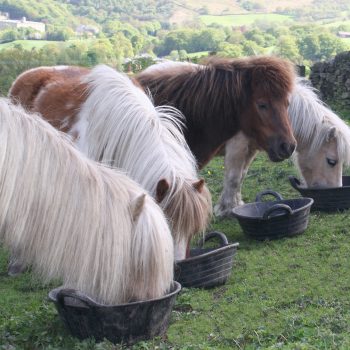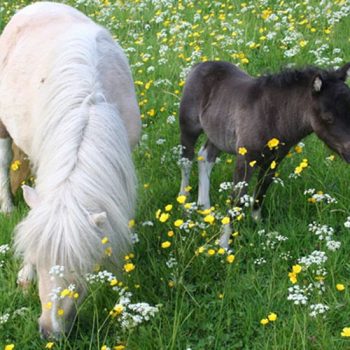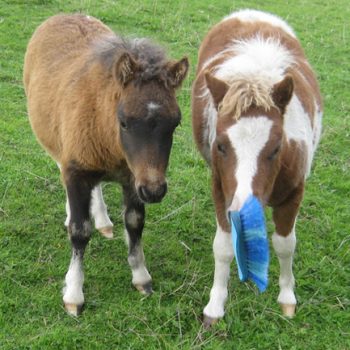General Health
Tips on health aspects



General Health
Our ponies are rarely sick or sorry but of course there are signs to watch out for. Even with the best care, occasionally ponies can be ill. Once we have got to know a pony, we can often tell that a pony is out of sorts. We had the misfortune of a mare slipping a foals a few years ago and found the kitten sized foal in the field shelter. On inspection, no mare showed any sign of being the one who had lost her baby but I guessed which mare had lost as I’d seen her “off” for a couple of days before – just quieter that normal and looked slightly down in the dumps though nothing particularly obvious or that you would ever call a vet for. Rescanning proved my thoughts. The foal was taken to Liverpool vet school where it was examined and, though not conclusive, it was thought the foal had not developed properly. The good news is that the mare has gone on to have 2 super healthy fillies since. We mention some health conditions here for information.

Nevertheless we keep the usual few first aid bits handy: a digital thermometer, some animalintex, vet wrap, antiseptic cream, dermoline shampoo etc
Lameness
I was always told start at the foot and work up! The only instances of lameness for us have been foot abcesses though, thankfully, only ever 2 occurrences. The ponies affected became acutely lame overnight and found it difficult to put any weight at all on the affected foot but a vet (or your farrier) can provide instant relief. Once they release the pus, then the pony is kept in and the foot is kept clean, and an animalintex poultice applied with vet wrap and recovery is usually quick.
Laminitis is a dreadful, painful condition and taking immediate steps to restrict grazing/ get pain relief and seek veterinary advice is essential. Spring is a danger time as is September but it can occur at any time. Can be caused by ponies gorging on long grass, stress or can occur during other illness. If a pony was showing signs of becoming tender on their feet we would bring indoors or in very restricted grazing area and feed Laminitis Trust approved feeds. Their website is a good source of information about laminitis.
Skin Problems
Lice can affect the ponies causing disomfort and rubbing. Can affect ponies over winter particularly in thick mains and tails. Special shampoos and powders are available to treat.
Sweet itch can cause major irritation with ponies rubbing to the point of bleeding particularly April to October. Again, treatments are available, none we have tested as never had a case but I’ve been told “stinky stuff” works well. Stabling and fly rugs can help ease the ponies discomfort.
Colic
Pawing, rolling, sweating may indicate a case of colic. Varying causes, thankfully only had 2 mild instances where the vet came and gave pain relief. I went to an event called “Inside Natures Giants” in 2018 – an anatomy learning opportunity using post mortem parts. It brought home the size of the stomach and emphasises the need to feed more small feeds rather than one large feed.
Hyperlipaemia
Fortunately, a very rare condition but a very serious condition which shetlands can suffer from. Google it for a full explanation but in very simple terms the pony releases excessive amounts of fat reserves into the blood stream, sometimes to the degree that when blood is taken, fat can be seen floating on top. It can happen when the pony has a sudden reduction in food intake / appetite , some say stress is a factor or other illness where the hyperlipaemia becomes a secondary condition. The important factor is early diagnosis as intravenous glucose and special encouragement to eat can mean the difference between a pony overcoming this or not. If a pony stops eating then we would advocate calling your vet immediately. A friend of mine had the misfortune of one of her ponies contracting hyperlipaemia which she acted upon quickly and found the only thing she would eat was sliced brown bread (with vet help also thankfully she recovered). Complan mixed with electrolytes is also recommended, syringe fed if necessary.
There is, of course, a multitude of other problems you could have the misfortune of your pony suffering such as coughs, runny noses, eye problems, colic – we would say if in doubt take your vet’s advice but, in the main, you likely won’t need to.
visit us
Visitors are welcome but please contact us first.
- Kettlesnout, Ripponden, West Yorks. HX6 4PA
- andreamerri@yahoo.co.uk
- 01422 822888 or 07813130179
- Message us on facebook